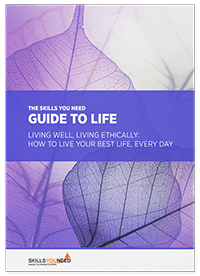Patience
See also: Self-ControlIt is often said that patience is a virtue. But in this on-demand world, is being able to wait patiently really still necessary?
There are so few things for which we really have to wait nowadays that patience can seem an outdated idea. Even other uses of the word—as a girl’s name, and for a card game—have largely disappeared, replaced by more modern equivalents.
This page discusses the idea of patience, and why it might be important. It goes on to suggest some ways in which you might try to cultivate patience in your life.
A Definition of Patience
patience n. the quality of being able calmly to endure suffering, toil, delay, vexation or the like; sufferance.
patient sustaining pain, delay etc. without repining: not easily provoked,: persevering in long-continued or minute work: expecting with calmness.
Chambers English Dictionary, 1988 edition.
Patience, then, is the ability to wait calmly for or through something. If it is a virtue, it seems likely that there must be some element of suffering in the waiting, even if the suffering is only boredom and not necessarily physical pain.
Some commentators have suggested that patience is not a single virtue, but a combination of others, including:
Self-control, to be able to control our own reactions to the situation, and endure it without complaint;
Humility, to accept that you are no more important than anyone else, and there is no particular reason why you should not wait; and
Generosity, to smile at the world even when it seems to be conspiring against you.
Why is Patience Important?
The Stanford Experiments
Back in the 1960s and 1970s, a series of studies were carried out at Stanford University on delayed gratification.
Broadly, children were given a small treat, such as a marshmallow or a biscuit. They were told that they could eat it immediately, but that if they waited to eat it until the researcher returned, they would get two treats instead of one, or a preferred treat. The researcher then left the room for 10 or 15 minutes, before returning.
As you might expect, some of the children ate the treat immediately, and others waited for the researcher to return, and claimed their greater reward.
What is interesting about this experiment is that follow-up studies found that the children who waited, and claimed the double reward, generally had better outcomes later in childhood. For example, ten years later, their parents reported that they were more competent, and they had better educational attainment, and lower body mass index.
The Stanford experiments showed, effectively, that patience does matter.
Being able to accept a delay in receiving a reward, and understanding that the rewards of that can be greater, can lead to increased success in life.
Patience vs. the world
The growth in technology, in particular smartphones, has led to instant gratification becoming the norm. Computer games provide instant feedback. We can post things on social media and get an immediate response from our friends. Information is available at the touch of a screen: no more having to go to the library and look things up.
Amazon has invested in drone technology because, it says, its customers are too impatient to wait for next-day delivery. When they order something, they want it now, not later.
In other words, we have become used to instant, rather than delayed gratification.
The thought of waiting for anything has become anathema.
Put this together with the results of the Stanford experiments, and the picture starts to look quite worrying.
If success in life comes from being able to wait, are we raising a generation (or several) who will struggle with life? Anecdotally, there are reports that this may be true. Employers have commented that young people joining the workforce now expect everything to be given to them. They don’t necessarily expect to work for their rewards, and they don’t expect to take time to build up their skills. Perhaps this is an exaggeration—indeed, perhaps all generations have felt like this—but the picture is not reassuring.
Fortunately, it is possible to take action to develop your own patience and, for parents, that of your children.
Further Reading from Skills You Need
The Skills You Need Guide to Life: Living Well, Living Ethically
Looking after your physical and mental health is important. It is, however, not enough. Maslow’s famous hierarchy of needs suggests that most of us need more than that. We need to know that we are living our ‘best life’: that we are doing all we can to lead a ‘good life’ that we will not regret later on.
Based on some of our most popular content, this eBook will help you to live that life. It explains about the concepts of living well and ‘goodness’, together with how to develop your own ‘moral compass’.
Cultivating Patience
Some ideas for cultivating patience in yourself or your children include:
Identify something that you want to buy or do, but cannot afford, and save up until you can.
Although particularly effective for children, this is a useful exercise for adults too, particularly those who are prone to spending on credit. With children, you may want to encourage them to earn money through doing chores that they would not otherwise do. It is also helpful to identify an amount that you want to save each period.
Go and sit in an art gallery and look at a single picture for an extended period of time.
Art historian Jennifer Roberts, at Harvard University, recommends three hours, explaining that this is meant to be an uncomfortably long time. However, even sitting in front of one picture for 15 or 20 minutes will enable you to see new things, and experience the idea of being impatient and then settling down.
Take up gardening, and pursue it over a period of weeks or months
Growing plants, particularly from seed, cannot be hurried. Neither can the seasons. Spending time gardening is a useful reminder of a slower way of life, and having to wait to see what will happen. It is also very good for your humility, as sometimes plants die, despite your best efforts, and slugs and snails are very hard to control.
Read classic books
Classic books such as those of Charles Dickens and Anthony Trollope are often very long, because they were written and published in serial form, weekly or monthly. Their language is often difficult for modern audiences, with long passages of description. Taking time to read them (in book form, not on an electronic reader) can help you to develop more patience and a longer attention span.
Put away all screens for a set period
There is a growing recognition that frequent and regular interaction with technology can affect neural pathways, and perhaps prevents you from improving your patience. Try putting away your technology for a defined period (say, an hour, at first, but trying working up to ‘a whole holiday’) and see how you get on. You may also find our page on Screentime for Children interesting.
There are, of course, many other options for slowing down and developing your ability to wait. These are just a few examples.
A final thought
The expansion of instant gratification in our world may make it feel that patience is overrated. But those who can wait often get a greater reward in the end. This suggests that trying to develop patience is more important now than ever before.
There are some things, it can be argued, which cannot and should not be hurried. Nobody has yet found a way to reduce the length of pregnancy, for example. Learning to wait with patience could bring dividends in more than one way.


